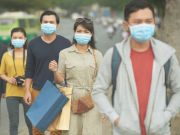THURSDAY, Jan. 30, 2020 (HealthDay News) — The dreaded coronavirus in China has many reaching for face masks across the globe.
But while mandatory in Wuhan, China, where the virus originated, a face mask is of little use, practically speaking, some experts say.
“A surgical mask might provide some protection, but it’s going to be very modest,” said Dr. William Schaffner, a professor of preventive medicine at Vanderbilt University in Nashville, Tenn.
No definitive studies exist that prove masks prevent infections. Also, masks are designed for different purposes, and only some guard against infectious diseases.
Picking the right type of mask may be key, said one researcher.
“Several studies, including research from my group, show that if worn properly, masks can protect people in the community from respiratory illness, especially [those] in close contact with sick people,” said Dr. Raina MacIntyre. She’s head of biosecurity research at the University of New South Wales in Sydney, Australia.
MacIntyre’s group did a study where parents of a sick child wore a mask at home. Those who wore the mask at all times were protected, she said.
“When infection is widespread, it may be useful,” she noted.
However, images from China show people wearing face masks that aren’t likely to help, MacIntyre said.
“I recommend disposable masks,” she said. “The cloth masks used commonly in China may not be protective. We did a trial of these, compared to disposable masks, and wearers had a higher risk of infection. This may be because the cloth masks are not washed regularly and may retain moisture and become contaminated.”
So far the coronavirus has spread to 19 countries, with five confirmed cases in the United States. In China, nearly 6,000 have been infected, with 132 dead.
Schaffner noted that this coronavirus spreads the way flu does, yet the U.S. Centers for Disease Control and Prevention doesn’t recommend face masks as a way to avoid flu.
“The reason is that CDC requires scientific evidence to show that any intervention they recommend is likely to have value. It turns out that evidence for using masks in the community is scanty at best,” he said.
Also, masks have different uses. Schaffner said a flimsy painter’s mask prevents paint from getting in your mouth or nose, but won’t stop a virus.
Then there are surgical masks. These are designed to keep fluids or germs from the doctor from contaminating the sterile field in the operating room. But viruses can still pass through it to the wearer, Schaffner said.
When doctors are treating patients who have a communicable disease, they wear a type of mask called an N95 respirator. Because this mask is sealed around the mouth and nose, it will block a virus. But using it requires special training, and it makes breathing harder and is uncomfortable to wear, Schaffner said.
So what can you do to guard against the coronavirus? Schaffner said the best precaution to follow is the same as protecting yourself from the flu, namely, avoid being around people who are sick, and wash your hands often.
Dr. Amesh Adalja, a spokesman for the Infectious Disease Society of America, said surgical masks and respirators offer protection in the health care setting and do offer some protection to the general public.
“However, most people in the general public don’t wear them properly. They stick their hands under them,” said Adalja, a senior scholar at Johns Hopkins University Center for Health Security.
Adalja added that the risk to the United States right now from this coronavirus is very small. “Buying these masks could have unintended consequences, including shortages, demand spikes and price increases,” he said.
“It’s not really necessary to wear a mask to protect yourself,” Adalja noted. “It’s not something Americans need to do.”
More information
For more on medical face masks, see the U.S. Centers for Disease Control and Prevention.
Copyright © 2025 HealthDay. All rights reserved.

